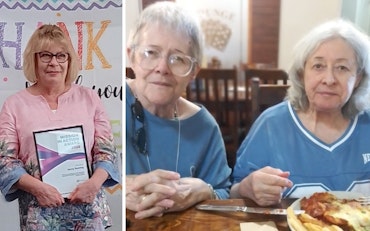Maggie Beer Foundation delivers urgent aged care food and nutrition report to Govt
Aged care nutrition advocacy group, the Maggie Beer Foundation (MBF), started by well-known Australian cook, Maggie Beer, has provided a comprehensive report about aged care food, nutrition and the dining experience to the Department of Health.
![<p>The Maggie Beer Foundation says the recommendations in their report aligns with the recommendations in the Aged Care Royal Commission’s Final Report released last week. [Source: iStock]</p>](https://agedcareguide-assets.imgix.net/news/articles/news/articles/MBF-delivers-aged-care-nutrition-report-10.3.2021.jpg?fm=pjpg&format=auto&w=550&q=65)
The Maggie Beer Foundation says the recommendations in their report aligns with the recommendations in the Aged Care Royal Commission’s Final Report released last week. [Source: iStock]
Released this morning, the report is the result of the National Congress on Food, Nutrition and the Dining Experience in Aged Care held in Sydney last month in February.
It was the first National Congress of its kind, covering the relationship between food, nutrition, and the dining experience, and the wellbeing outcomes for older Australians.
MBF says that many of the recommendations in the report align with the recommendations from the Royal Commission into Aged Care Quality and Safety’s Final Report. Financial organisation, Deloitte, helped prepare this report which highlights 56 findings and 139 potential action points across nine key topic areas.
Mrs Beer says, “We know the role of food in aged care is currently undervalued. Focusing on food and appetite and, in doing so, good nutrition stimulates the senses, supports health and wellbeing, provides pleasure, conveys respect and care, and acts as a facilitator for social interaction.
“It provides a sense of purpose and anticipation. It is at the heart of quality of life, and it is an urgent issue.”
Working groups at the Congress discussed opportunities and best practice for food and nutrition in aged care and identified several themes, including:
-
Food, nutrition and the dining experience is an urgent issue
-
The variability of quality meal experiences across aged homes, as some provide initiatives that demonstrate improved practices but other homes are still exhibiting poor practices
-
Lack of transparency and accountability for the delivery of food, nutrition and the dining experience. Improved practice screening and reporting on malnutrition will assist with improved outcomes for residents
-
Aged care workforce engaged in the planning, preparation and serving of food are not adequately rewarded or skilled to fulfil their roles
-
Residents do not have adequate access to health and allied health professionals, like dietitians, speech pathologists, dentists and dental hygienists, physiotherapists, mental health workers, and other experts
-
Increased dental services in aged care is necessary to alleviate eating problems and to assist residents who enter aged care with poor oral health
-
New mechanisms to ensure collaboration between management, nursing staff, kitchen staff, and resident foodie groups to result in better food that suits cultural and residential diversity
-
Infrastructure changes to allow the joy of food for residents, including home-styled kitchenettes where food can be plated, residents participate, and the aromas and flavours of fresh food drive appetite
The working groups at the National Congress consisted of leaders and experts in the aged care sector.
This included Government departments, like the Department of Health, Department of Veterans’ Affairs, and the Aged Care Quality and Safety Commission; experts like Ngaire Hobbins from Dietitians Australia; and peak bodies across the sector, including Aged and Community Services Australia, the Australian Dental Association, Council on the Ageing Australia, Dementia Australia, Federation of Ethnic Communities’ Council of Australia, and Leading Age Services Australia.
The Maggie Beer Foundation believes the findings and recommendations in the report will inform future Government policy for food and nutrition in aged care.
Mrs Beer says, “The findings of the National Congress and its close alignment with the recommendations of the Royal Commission into Aged Care’s Final Report is such a positive step forward and an opportunity to bring all stakeholders together around the table to find real solutions that our aged care residents deserve.
“There are so many people in aged care working so hard but often without the support or being empowered to do things better but when given the respect together with the skill, the practical ideas along with the inspiration, it is an incredibly powerful thing that we have seen individuals bring about amazing change.”










